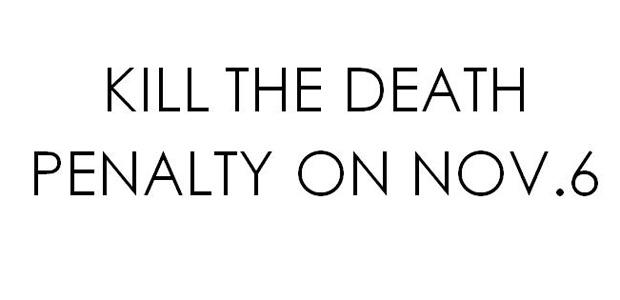Since it was resurrected by Californians in the 1978 election, the death penalty has been nothing but a disaster for the state.
Fortunately, on Nov. 6, Californians can fix their mistake by passing Proposition 34, the SAFE California Act, which would execute the death penalty.
Capital punishment has failed the state in every possible way. Not only for moral reasons, but for economic reasons as well. The death penalty has drained billions of dollars from the economy over three decades as well as failing as a deterrent.
In the last 34 years, the death penalty has cost taxpayers more than $4 billion with only 13 executions to show for it. More than $130 million is spent every year on court costs including appeal trials, lawyers fees, maximum-security prison guards, and segregated housing for death row inmates. It costs $175,000 more to keep an inmate on death row than housing those serving life in prison.
That money would be better off on spending on things that actually help stop violent crime, such as education and solving crimes of rape and murder.
One of the main arguments for the death penalty is that it provides closure for the victims families. This simply isn’t true. Inmates on death row are more likely to die of suicide and natural causes such as old age than by execution.
Convicted murderers spend decades in the appeals process, which results in families facing the man or woman who killed their loved ones over and over again, never giving them a sense of peace and justice.
While the Los Angeles Times backs Proposition 34, its Sunday edition featured an op-ed from James Ardaiz, a former prosecutor and judge, in favor of keeping California’s death penalty alive, stating that it serves as a moral deterrent from serious crime.
Capital punishment does not work as a deterrent. Executions in California have been put on hold since 2006 and since then, the homicide rate has decreased by 23 percent.
Jeanne Woodford, a former San Quentin State Prison warden who has overseen four executions, serves as executive director of Death Penalty Focus of California, a group aimed at death penalty alternatives.
In an interview with Democracy Now, Woodford endorsed her support for Proposition 34. She said she wasn’t alone in her support — eight other wardens have signed a letter advocating to put an end to the death penalty in California.
“And by having that punishment, life in prison without possibility of parole, you’re not asking public servants to be involved in an execution and risk executing an innocent person, which we know has happened across this country,” said Woodford.
The worst and most inexcusable consequence of capital punishment is the case of wrongful convictions of innocent men and women.
The justice system is broken. According to the National Registry of Exonerations, three men on death row have been exonerated in California since 1996. Seven inmates have been released from life without parole since 2003. Thirty inmates sentenced to life in prison have been exonerated since 1991. Life in prison is not only a harsher sentence, it gives those who have been wrongfully convicted a chance to one day be released.
If passed, the main component of Proposition 34 would be to replace the death penalty with life in prison without the possibility of parole.
Whatever money these prisoners earn while working in prison would be given to victims’ families. The proposition would also distribute $30 million per year over the next three years to aid police departments in solving murders and rapes.
Republican lawyer Don Heller, who wrote Proposition 7 in 1978 which brought back the death penalty in California, is now in favor of abolishing it. If he can change his mind, so can Californians on Nov. 6.


